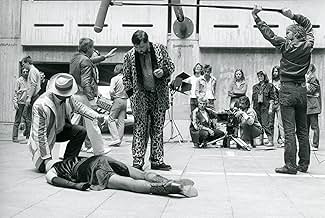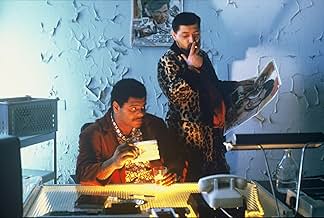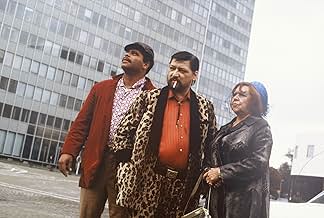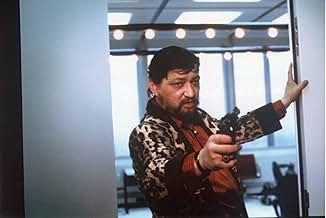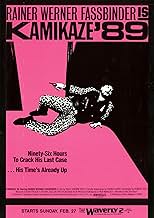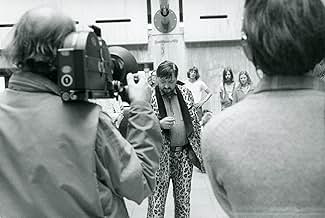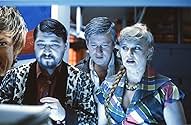Dans une société totalitaire du futur, dans laquelle le gouvernement contrôle toutes les facettes de la presse, un inspecteur de la criminelle enquête sur une série d'attentats à la bombe, e... Tout lireDans une société totalitaire du futur, dans laquelle le gouvernement contrôle toutes les facettes de la presse, un inspecteur de la criminelle enquête sur une série d'attentats à la bombe, et découvre plus qu'il ne l'avait prévu.Dans une société totalitaire du futur, dans laquelle le gouvernement contrôle toutes les facettes de la presse, un inspecteur de la criminelle enquête sur une série d'attentats à la bombe, et découvre plus qu'il ne l'avait prévu.
- Réalisation
- Scénario
- Casting principal
- Récompenses
- 1 victoire et 3 nominations au total
- Wechselschichtregisseur
- (as Andreas Mannkopf)
- Polizeiärztin
- (as Ute Fitz-Koska)
- Polizist
- (as Hans-Eckhardt Eckhardt)
Avis à la une
Being a big Fassbinder fan, I rented this with excitement. Fassbinder stars, and he's always fun to watch. It's one of those punk-future-dystopian movies that popped out a bit in the early '80s, always good for some cult fun. It came out at the end of Fassbinder's career, and Fassbinder's whole 12 year filmmaking period only got better and better until his end.
So half way through I thought "what the hell happened? This movie is an atrocity exhibition."
Then I glanced at the cover, and in horror noticed this movie was NOT directed by Fassbinder. He just starred in it in a coked up narcisstic haze. I read he actually wore that leopard outfit he was giving in this movie on and off again in the last few weeks of his life.
Fassbinder was proud of this movie, somehow, and that gives it an odd charm. It's horrendous, but I haven't regretted watching it. There's a scene where Fassbinder climbs to a roof of a building, odd buzzing music is playing and the wind is blowing his hair and he has this perverse smile on his face as he gazes out across the city. There's also the ending where Fassbinder, bloated, in a robe, girates his body against a photo of an astronaut (I'm guessing this is Fassbinder's input, as the exact same ending pretty much is used in Stationmaster's Wife). These two scenes made it worthwhile. Otherwise, mark it off as an awful "Alphaville" rippoff.
The story takes place in 1989, 1989 as anticipated in 1982, in a future and totalitarian Germany. Fassbinder plays in this film the role of police lieutenant Janssen, called to investigate a suspected bombing, followed by a crime in the corporate headquarters that controls the morale of the population through television entertainment. His mission to solve the crime in the next four days is hampered by the fact that in the utopian society described in the film, officially, there are neither crimes nor suicides. The world of 'Kamikaze 89' is a rosy dystopia, in which the population is kept under control by Big Brother surveillance while the brains are washed and occupied by television shows such as the 'World Laughter Record'. The cynical, alcoholic and disillusioned Janssen may be the right man to solve this case, but as the circle of suspects gets closer to the company's bosses and that mysterious, secret '31st floor' in which the scenarios of future are written, the solving of the crime becomes a danger for the stability of the system.
The comparison between the future imagined in the literature and the films of anticipation and the reality of the anticipated period is, as always, fascinating. Although the interval is only seven years, the essential changes are those that take place in the social structure. Director Wolf Gremm did not have a budget that would allow him to create spectacular special effects, so he relied more on cultural extrapolations, some subtle, some less subtle. The Internet does not exist yet, and computers are as large as refrigerators and do not have graphical interfaces. Telephony and mobile videophones are controlled by the authorities. The population is fascinated by popular entertainment, and on this topic Gremm was able to correctly anticipate the devastating effect of 'reality show' genre, even if the phenomenon he described will occur one or two decades later than 1989. Electronic music and psychedelic clothing have become an aesthetic norm, and if we look at some societies in Asia today, we see that cultural conformism is not necessarily gray and militarized there. Leopard coats or jackets are police uniforms. The control of populations is facilitated by their addiction to escapist entertainment. The framing of the film in the patterns of the genre of punk anticipation is formally correct, but the stylistic decisions are motivated by a clear and not at all optimistic vision about the future.
Fassbinder's acting reminded me Orson Welles in the second part of his career. The director who gave the world in his youth the masterpiece 'Citizen Kane' constantly projected for grand plans, but after a few financial failures Hollywood no longer believed in him as a director. The result was that he appeared more as an actor, some of his roles were memorable as he succeeded to be both expressive and 'to melt' in his characters, modeling them according to his personality.
'Kamikaze 89' anticipates from many points of view the world 30 years later, with the domination of the big global corporations and the popular entertainment and communications as means of leveling the thinking of the population. 1989 however brought something else, the fall of the Iron Curtain followed by the reunification of Germany, historical events that Fassbinder prepared and anticipated artistically and ideologically in other films. Those were the milestones in the evolution towards the world of 'Kamikaze 89'.
The soundtrack is entirely original and is penned by Edgar Froese of Tangerine Dream. I am assuming that was not cheap for the producers to arrange.
With a good cast, good soundtrack, you have what appears to be a good futuristic sci fi script. An antihero cop and his partner are called in to organize an evacuation of the building for the most important corporation in the country (or world, was a little fuzzy of how far it reached). The bomb threat turns out to be a hoax, then things get twisted and confusing. I'd describe the story has having half devils battling half angels except you can't tell if they are fighting themselves or there really is a certain opposition. The film ends with major events not appearing on film. In fact, the film feels like it's missing most of the third act before coming to an abrupt conclusion. You sort of have closure during the very end but the exposition is coming from a news broadcast. It could have been thrown on in post production just to save the project and get it rushed to release in time to still cash in on the international success of Blade runner (both are futuristic sci fi stories but Blade Runner debuted a month before this), or perhaps to capitalize on the untimely death of Fassbinder who died unexpectedly 6 weeks before this film was released.
Regardless of the reasons, you get what might have been a complex story, well acted and brought to life via an interesting plot and without the need for cheap special effects. Alas, you get the pretense of a good story and are stuck trying to piece together the events in the second and third acts. It's a chore.
I've watched this several times. I, like most I imagine, was drawn to this movie if only to see the type of film project Fassbinder would simply act in without much more creative input. The film looked like it was trying to follow the same approach of Fassbinder sci fi experiments like World on a Wire. Maybe if Kamikaze '89 were almost three and a half hours long to explain what the heck is happening like World On A Wire is then perhaps things would be different. Instead, good luck with the 106 minutes you get.
Disguised as a predator, Lt.Jansen is an amoral and voyeuristic, yet totally flaccid being. Tired and sluggish this detective only incriminates himself - but the Inquisitor he faces - is us.
I liked this odd movie - it is neither all low nor all high-brow art. It will probably put many to sleep - the violence is gratuitous and minimal, the main character is a walking dead man (interesting fact is that Fassbinder after dying in real life was BURIED in the costume of Lt.Jansen) - it has a charm that remains intact despite its pedigree as art-house junk.
Le saviez-vous
- AnecdotesThis was the final acting role for Rainer Werner Fassbinder.
- GaffesThe movie claims 27 September 1989 to be a Monday, but that day was a Wednesday (The movie plays in 1989, as the title and a spoken intro make clear. The supposed explosion in the beginning of the movie was planned to take place on September 23, as Jansen points out. The chief of the police then urges Jansen to solve the case within for days, saying "until Monday afternoon," which would be September 27).
- Citations
Policewoman: Suicide
Polizeileutnant Jansen: It would be the first in four years.
Policewoman: Sorry, I meant 'premature death.
- ConnexionsFeatured in Fassbinder (2015)
Meilleurs choix
- How long is Kamikaze 89?Alimenté par Alexa
Détails
Box-office
- Montant brut aux États-Unis et au Canada
- 22 440 $US
- Week-end de sortie aux États-Unis et au Canada
- 5 613 $US
- 5 juin 2016
- Montant brut mondial
- 22 440 $US


